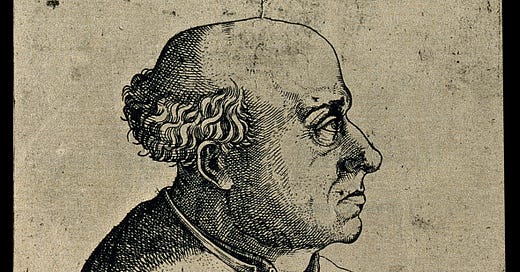A Beginner’s Guide to Toxicology
Amateur researchers often fail to understand that the dose makes the poison
"File:Aureolus Theophrastus Bombastus von Hohenheim (Paracelsus). Wellcome V0004455.jpg" is licensed under CC BY 4.0
We’ve already seen that amateur researchers have much to learn from an ancient school of philosophy, probability theory, behavioural economics, modern psychology and business theory. It is time to throw toxicology into the mix.
Toxicology – the study of poisons - was developed during the Medical Renaissance. It was a time that scholars were discovering and translating ancient medical texts into Latin, while original thinkers were making discoveries that would lay the foundations of modern medicine.
Theophrastus von Hohenheim was a Swiss physician, who was born in 1493, a year after Christopher Columbus’ first trip to the Americas. He published under the pseudonym Paracelsus, including a seminal work on the then-embryonic field of toxicology. It was written in 1538, but was first published in 1564, some 23 years after his death.
Paracelsus is best known for discovering one of the basic principles of toxicology: “All things are poison, and nothing is without poison; the dosage alone makes it so a thing is not a poison." This is usually condensed to a pithier phrase: "The dose makes the poison." The basic idea is that even benign substances, like water or oxygen, can be poisonous in large doses.
Although Paracelsus’ principle has stood the test of time, it is little known by the general public. Sadly, this leads amateur researchers to make basic mistakes when they develop black-and-white narratives about certain substances being panaceas for all our ills or utterly dangerous to everyone all the time. They then nurture these narratives in internet communities. Three examples should make the point.
Anti-vaxxers
Vaccine denialists often struggle to understand why a small exposure to a substance that is designed to provoke a reaction from your immune system can be good for you, while uncontrolled exposure to a large dose of something similar in the wild can kill you. Even though Paracelsus died 257 years before Edward Jenner developed the first vaccine, he would have had no problems understanding the basic principle.
People who think that marijuana is a panacea for everything that ails us are often susceptible to conspiracy theories to explain away the reluctance of their family doctor to just prescribe cannabis. Paracelsus, however, would have no difficulty whatsoever understanding why a small dose of marijuana on a special occasion will give you a very different result from large quantities on a daily basis.
MMS
Gurus and con artists often tell gullible people that products based on a detergent called sodium chlorite are really a health cure. They sell it as MMS, which usually but not always stands for Miracle Mineral Supplement. Paracelsus would have understood right away why a couple of drops of sodium chlorite in gallons of water can help purify it, but drinking the substance more or less neat can kill you.
So, the next time you see someone on the internet telling stories about substances that will allegedly save you (or medical treatments that would allegedly kill you), ask yourself the following question: What would Paracelsus think? Another way of getting similar results is to Google the name of the substance along with words like toxicology. Check everything!
Sharpen Your Axe is a project to develop a community who want to think critically about the media, conspiracy theories and current affairs without getting conned by gurus selling fringe views. Please subscribe to get this content in your inbox every week. Shares on social media are appreciated! If this is the first post you have seen, I recommend starting with the critical-thinking rabbit hole.
[Updated on 10 March 2022] Opinions expressed on Substack and Twitter are those of Rupert Cocke as an individual and do not reflect the opinions or views of the organization where he works or its subsidiaries.



